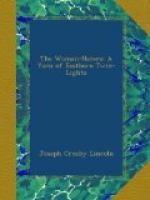BEHIND THE SAND DUNE
“A fog last night, wasn’t there?” inquired Brown. Breakfast was over, and Seth was preparing for his day’s sleep.
“Yes, some consider’ble,” was the gruff answer; then, more sharply, “How’d you know? ’Twas all gone this mornin’.”
“Oh, I guessed, that’s all.”
“Humph! Guessed, hey? You wa’n’t up in the night, was you?”
“No. Slept like a top all through.”
“Humph! . . . Well, that’s good; sleep’s a good thing. Cal’late I’ll turn in and get a little myself.”
He moved toward the living room. At the door he paused and asked another question.
“How’d you—er—guess there was fog last night?” he inquired.
“Oh, that was easy; everything—grass and bushes—were so wet this morning. Those boots of yours, for example,” pointing to the pair the lightkeeper had just taken off, “they look as if you had worn them wading.”
His back was toward his superior as he spoke, therefore he did not see the start which the latter gave at this innocent observation, nor the horrified glare at the soaked boots. But he could not help noticing the change in Seth’s voice.
“Wa—wadin’?” repeated Atkins faintly. “What’s that you say?”
“I said the boots were as wet as if you had been wading. Why?”
“Wha—what made you say a fool thing like that? How could I go wadin’ on top of a lighthouse?”
“I don’t know. . . . There, there!” impatiently, “don’t ask any more questions. I didn’t say you had been wading, and I didn’t suppose you really had. I was only joking. What is the matter with you?”
“Nothin’ . . . nothin’. So you was just jokin’, hey? Ha, ha! Yes, yes, wadin’ up in a lighthouse would be a pretty good joke. I—I didn’t see it at first, you know. Ha, ha! I thought you must be off your head. Thought you’d been swimmin’ too much or somethin’. So long, I’m goin’ to bed.”
But now it was the helper’s turn to start and stammer.
“Wait!” he cried. “What—what did you say about my—er—swimming, was it?”
“Oh, nothin’, nothin’. I was just jokin’, same as you was about the wadin’. Ha, ha!”
“Ha, ha!”
Both laughed with great heartiness. The door shut between them, and each stared doubtfully at his side of it for several moments before turning away.
That forenoon was a dismal one for John Brown. His troublesome conscience, stirred by Seth’s reference to swimming, was again in full working order. He tried to stifle its reproaches, tried to give his entire attention to his labors about the lights and in the kitchen, but the consciousness of guilt was too strong. He felt mean and traitorous, a Benedict Arnold on a small scale. He had certainly treated Atkins shabbily; Atkins, the man who trusted him and believed in him, whom he had loftily reproved for “spying” and then betrayed. Yet, in




